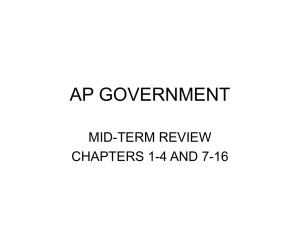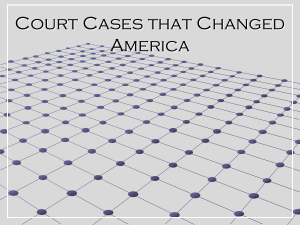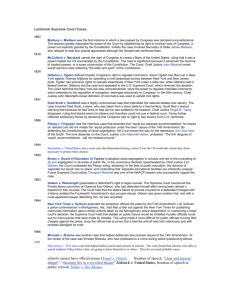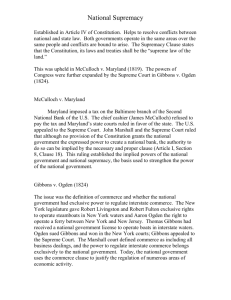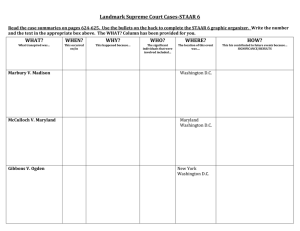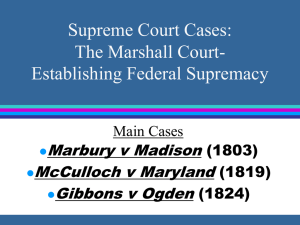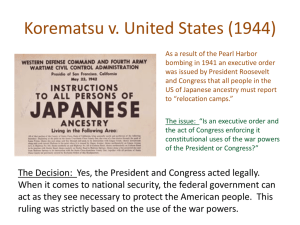PPT - Ms. Beets
advertisement
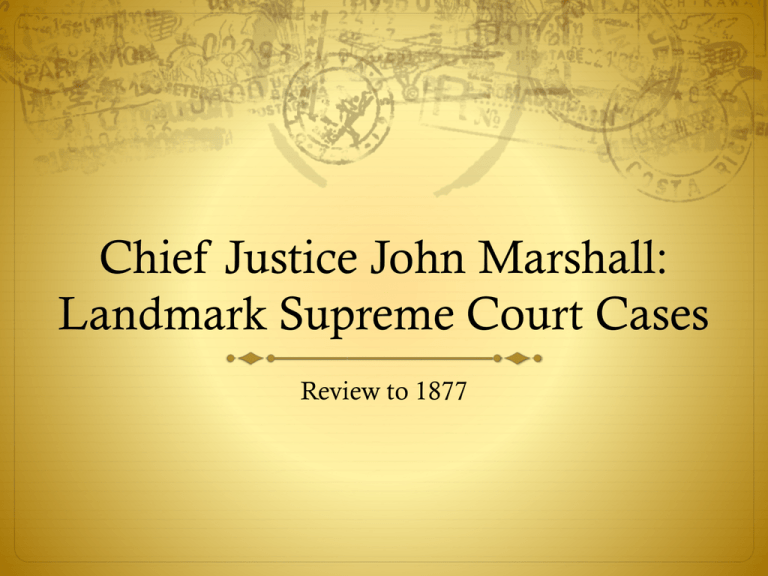
Chief Justice John Marshall: Landmark Supreme Court Cases Review to 1877 Agenda Bell Ringer EOC Review Booklet Supreme Court Cases Class discussion on the cases Bell Ringer Which guarantees freedom of the press, freedom of speech, and freedom of religion to individuals in the United States? A. The Treaty of Paris of 1783 B. The Articles of Confederation C. The 1st Amendment to the Constitution D. The 5th Amendment to the Constitution Which statement describes a limitation on government action established by the Bill of Rights? A. Congress controls interstate commerce B. The president shares control over foreign policy with Congress C. The Supreme Court can declare acts of Congress unconstitutional D. Government officials cannot enter a home without the owner’s permission or a valid search warrant EOC Study Guide You will read through each court case & create a Supreme Court Case foldable. This foldable must be turned in at the end of class so we can create our EOC Review Books for the May EOC. Each section will include the following Name of the case and date Reason for the case Constitutional Issue being reviewed Who was involved Courts decision The impact of the decision Summary of Chief Justice John Marshall’s quote Write the question about the case and your answer Quick Review: What is illustrated in this cartoon? What is message does this cartoon convey? How does this cartoon relate to Marbury v. Madison? How does the Artist identify the people in the cartoon? What is taking place in the cartoon? Which court case is represented in this cartoon ? Why? What political issue can this relate to in todays society What is illustrated in the cartoon? Which court case does it refer too? What message is the artist trying to convey ? What special interest group would support this cartoon Marbury v. Madison 1803 Midnight appointments by John Adams (Federalist) One of these was William Marbury as justice of the peace for the D.C. Adams signed appointments but Secretary of State John Marshall did not deliver them in time. Thomas Jefferson said the appointments were void Marbury took the case to the Supreme Court hoping that the court would require Jefferson’s administration to deliver the appointment papers. Judiciary Act of 1789 allowed the Supreme Court to order an action to be performed Decision: Judiciary Act (passed by Congress) is unconstitutional. The Supreme Court cannot issue the writs of mandamus needed to make Jefferson deliver the papers. Writs of Mandamus - A writ of mandamus or mandamus (which means "we command" in Latin), or sometimes mandate, is the name of one of the prerogative writs in the common law, and is "issued by a superior court to compel a lower court or a government officer to perform Marbury v. Madison (1803) "It is emphatically the province and duty of the judicial department to say what the law is. Those who apply the rule to particular cases, must of necessity expound and interpret that rule. If two laws conflict with each other, the courts must decide on the operation of each." — Chief Justice John Marshall Marbury v. Madison 1803 Constitutional Issue Article 3 says the Supreme Court is the head of the judicial system. Chief Justice John Marshall said the Supreme Court should have the power of judicial review Judicial review – Supreme Court as final judge of constitutionality of actions of the executive and legislative branches Judicial review: This case established the Supreme Court's power of judicial review—the authority to review laws passed by Congress and declare them unconstitutional. William Marbury had sued Secretary of State James Madison to force delivery of a judicial commission. Had he won, the incoming administration of Thomas Jefferson might have ignored the order. Chief Justice John Marshall's brilliant idea was to agree that Marbury should have gotten his commission under the law, but that the law itself was unconstitutional. Marshall thus strengthened the young Court rather than weakening it. Later cases further established the Court's authority to rule on constitutional issues. Question: the United States is one of the few countries in which the highest court of the land has the power to declare a law unconstitutional. Do you believe that such a power is of benefit to a country? Explain your answer. McCulloch v. Maryland 1819 Second Bank chartered by Congress in 1816 West and South disliked Bank Some states prevented the Bank from operating, some taxed the Bank George McCulloch a Bank cashier issued bank notes without paying the Maryland tax Maryland courts ruled against McCulloch; he appealed Decision: “necessary and proper” clause in the Constitution allows Congress to create a bank. States cannot tax the federal govt. McCulloch v. Maryland 1819 ". . . Although, among the enumerated powers of government, we do not find the word "bank" or "incorporation," we find the great powers to lay and collect taxes; to borrow money; to regulate commerce; to declare and conduct a war; and to raise and support armies and navies . . . But it may with great reason be contended, that a government, entrusted with such ample powers . . . must also be entrusted with ample means for their execution. The power being given, it is the interest of the nation to facilitate its execution. . . . " — Chief Justice John Marshall McCulloch v. Maryland 1819 Constitutional Issues: Powers of Congress Relationship between federal and state authorities Implied powers granting the federal government more power Foundation for the New Deal in the 1930s and the welfare state of the 1960s The decision written by Chief Justice John Marshall in McCulloch v. Maryland remains one of the U.S. Supreme Court's most important decisions. By establishing the doctrine of implied powers and the principle of broad constitutional construction, this decision did much to eliminate the need for many amendments that have been introduced in an attempt to expand congressional powers. At the same time, by recognizing the broad reach of congressional powers, the decision has enhanced the importance of such explicit restraints on such powers as those found in the Bill of Rights (1791) and elsewhere in the U.S. Constitution Question: What is the objective of the “necessary and proper” clause? Gibbons v. Ogden 1824 1798 NY Legislature gave Robert Fulton a monopoly for steamboat navigation in NY Partner gave Ogden license to run a ferry service between NY and NJ Competitor Thomas Gibbons received a license from the federal government to run a ferry between NY and NJ Ogden got the NY state court to forbid Gibbon’s boats in NY Gibbons appealed to the Supreme Court Decision: Gibbons won because the federal government has the right to regulate interstate commerce including navigation Gibbons v. Ogden 1824 ”. . . Few things were better known, than the immediate causes which led to the adoption of the present constitution . . . that the prevailing motive was to regulate commerce; to rescue it from the embarrassing and destructive consequences, resulting from the legislation of so many different States, and to place it under the protection of a uniform law.” — Chief Justice John Marshall Gibbons v. Ogden 1824 Constitutional Issues Constitution did not clarify interstate commerce (Article 1 Section 8) Congress has the power “to regulate commerce with foreign nations, and among the several States” Is navigation a part of commerce? How much can Congress regulate commerce? Can states also regulate interstate commerce? One of the most important powers that the Constitution granted to Congress in Article I, Section 8 was the power "to regulate Commerce with foreign Nations, and among the several States, and with the Indian Tribes." The absence of such a congressional power had led to considerable inconvenience during the Articles of Confederation, and states had often treated one another as foreign nations. Of all the cases that have interpreted the scope of congressional power under the commerce clause, none has been more important than Gibbons v. Ogden. In this case, the U.S. Supreme Court invalidated a state monopoly and reaffirmed Congress' power to oversee commerce between states. Question: In what way is Marshall’s ruling in the Gibbons case consistent with his other decisions? Do you agree with Marshall’s ruling? Explain why.
